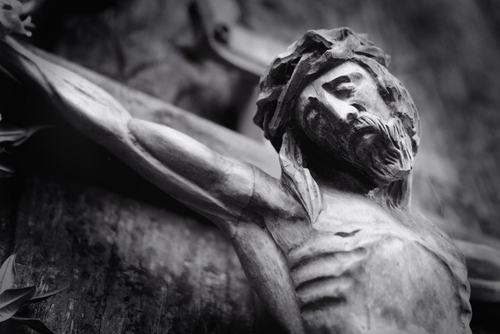
I once met an associate pastor who surprised me by saying he found wearing a cross repulsive. To be fair, he was not a seminarian, but worked in an administrative position. He asserted that a cross was an ugly thing, a symbol of death and suffering, and he did not understand why anyone would wear something reminiscent of so much pain.
In some variations of the Christian faith, I think there’s a tendency to skip over the events of Good Friday, and the reality of the crucifixion of Jesus. After all, to understand the meaning behind the suffering of that day, we must fully embrace the depths of our sin: not a popular pastime in a culture for which the highest values are good self-esteem and tolerance of anything and everything.
To understand the Cross, we must acknowledge that we are not “good,” and therefore not acceptable to a perfectly perfect and Holy God. While these are not pleasant meditations, without this awareness and understanding, the Resurrection of Jesus and the Easter celebrations are meaningless and empty.
While the above-mentioned pastor was certainly correct about the original meaning of a cross, I think he had not yet fully embraced the truth that through Christ’s suffering and death, that which is ugly is made beautiful. Not only is the symbol transformed, but also those who embrace The Cross, and the sacrifice, mystery, and overwhelming love of the one true God.
After his conversion, 20th century poet T. S. Eliot wrote many lines expressing the deeper truths of Christ’s sacrifice and what it means to embrace Christianity. Among his powerful “Four Quartets,” is a profound passage from “East Coker” which describes the Passion of the Christ in a modern context: a wounded surgeon who will heal us, but who must first destroy our sin. On first encountering these lines, I found them ugly and repulsive, but deeper study and meditation of their meaning has changed my mind. They are about a truth that is both good and beautiful; they are about The Cross.
For your Good Friday meditation:
The wounded surgeon plies the steel
That questions the distempered part;
Beneath the bleeding hands we feel
The sharp compassion of the healer’s art
Resolving the enigma of the fever chart.
Our only health is the disease
If we obey the dying nurse
Whose constant care is not to please
But to remind of our, and Adam’s curse,
And that, to be restored, our sickness must grow worse.
The whole earth is our hospital
Endowed by the ruined millionaire,
Wherein, if we do well, we shall
Die of the absolute paternal care
That will not leave us, but prevents us everywhere.
The chill ascends from feet to knees,
The fever sings in mental wires.
If to be warmed, then I must freeze
And quake in frigid purgatorial fires
Of which the flame is roses, and the smoke is briars.
The dripping blood our only drink,
The bloody flesh our only food:
In spite of which we like to think
That we are sound, substantial flesh and blood—
Again, in spite of that, we call this Friday good.
T. S. Eliot, “Four Quartets, East Coker”
